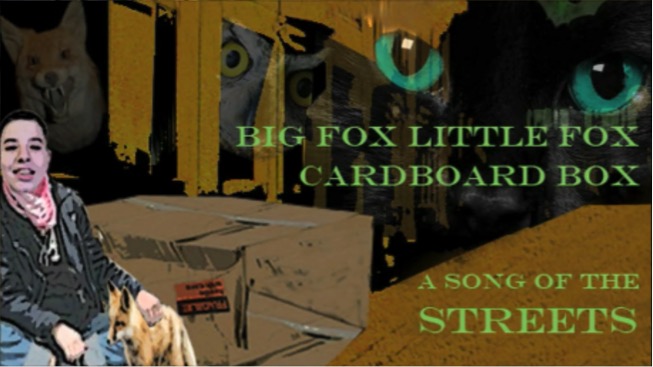Effective music practice and inclusion of the arts across school and out of school
Fox Hollies School
Fox Hollies is a special school for pupils ages 11 – 19. The whole school’s curriculum is underpinned by the arts, and the arts are used to enhance everything that is done. Alongside this, Fox Hollies has their own theatre company, ‘The Company’, that is run by the Headteacher, with music led by a colleague from a local community arts organisation.

Goals
Students use music and the arts to develop their own work and skills, as well as to interact with others (including other students, both mainstream and non-mainstream, siblings, staff and adults, some with learning difficulties and some without) and to gain a better understanding of the world around them. This is an example of a special school embracing the arts to engage, teach and inspire the pupils.
Does the example fit into a longer term plan or is it ‘stand-alone’?
The example is of a whole school curriculum, enriched by music and the arts in order to open up real, relevant learning that is enjoyable and sustained. An extension of this is an end of year performance by the school’s own theatre company, ‘The Company’. This performance group includes a majority of students from Fox Hollies Special school, although others are also involved, including children from other schools, (SEND and mainstream), adults with SEND. ‘The Company’ work with a visiting musician from ‘MAC Makes Music’ who provides innovative music making opportunities for children and young people in challenging circumstances, working from the principle that everyone has the right to express themselves through music. Creativity is at the heart of their diverse music offer in band development, song writing, singing, music technology and music production. The organisation runs from the Midlands Arts Centre, Birmingham.
Fox Hollies School 01 from inspiremusicorg on Vimeo.
Who is leading the work?
The curriculum was developed by the Deputy Headteacher and the ethos is upheld by the Headteacher and all the staff at the school. The end-of-year performance is student-led. Students are involved in every process, including composition, performance, lighting and art work. The visiting musician leads/supports the students in composing and performing the music for the show. MAC Makes Music also provides the venue for performances. The whole production is directed by the Headteacher.
What is the content of the work?
What are the key features of the teaching and learning approach?
The teaching and learning approach of the school as a whole is to use music and the performing arts to support learning in every subject. Examples of arts supporting learning through the curriculum have included Shakespeare coming to 'live' with us for a week in character to explore Romeo and Juliet with a writing focus. A whole term focus was on World War II in history, and culminated in three classes being evacuated to a local community centre where we cooked lunch for OAPs who had lived through the war. A visiting theatre company addressed maths and science topics – pyramids and light.
The ethos of the school is that all sounds can be music and all of the arts are allowed in lessons, so if students want to dance in their music lesson and sing in their history lesson this is acceptable. The school believes that every single child has the capacity to be creative and to use music and sound as part of a learning experience that makes sense to them. Their creativity and expressivity is nurtured and gives them a voice. One of the most important aspects of the approach is that it is student-led as far as is possible. The focus is on allowing the students to choose and to create something of their own that is accessible to them.
How is the work being reviewed?
Each taught session is evaluated by the staff involved and related to the subject that the Arts is supporting at that moment. Any written work is annotated and moderated and may be used as a piece of evidence towards progress. For example, if drama were supporting work in a history module, a student may have an Individual Education Plan (IEP) target to ‘Work with at least 1 peer for 10 minutes in a session’. Or it may also support communication-based targets, such as ‘To use 2 key words within the context of the lesson’. If there is no written outcome, staff may complete a witness testimony which supports progress in the same manner as above.
What are the positive outcomes for children/young people
All planned work at the school endeavours to support academic or social outcomes. Key Stage 3 works within the NC 14-19 towards ASDAN . ASDAN is a curriculum development organisation and awarding body, offering programmes and qualifications that explicitly grow skills for learning, skills for employment and skills for life, as used in special educational contexts, with qualifications in PPUs or PSDs. PPU = Personal Progress Units. These are able to include very early learners. The units which allow the arts to be addressed are; Engaging with the World around you:- technology, people and objects, Engaging in New Creative Activities. PSD = Personal and Social Development, i.e., Making the most of leisure time, Using technology (music), Working as part of a group.
The school offer the Arts Award 14-19 for all relevant students to allow them to achieve an arts relevant qualification. There are also many positive outcomes from taking part in the musical/arts performances in and out of school. These can be identified by teachers/learning support assistants and also parents involved in and watching the performances.
What are the key features of teacher/leader behaviour that are enabling those positive outcomes?
We request that all activities are planned appropriately to meet the needs of all the students within the group. Fox Hollies pupils are taught in mixed ability groups and so aims and objectives can look very different for almost every individual. This is because the school firmly believes that each student has a personalised pathway to follow. The school expects each taught session to be evaluated and then the next session to be planned on those outcomes.
In the music work created by The Company and through school rehearsals and performance, the work is primarily learner-centred. Teachers/practitioners understand the individual needs and abilities of all students and aim to support them to access the work in ways that are meaningful to them. Students are supported and encouraged during each step of creating their own sound(s) and music – such that the end product is truly their own work.
What are the key features of context, content and activities that are enabling those positive outcomes?
The school aims to dignify all its learners in the school. Whilst pupils may range 11-19 in age their cognitive abilities differ greatly from mainstream pupils of the same ages. Therefore, developmentally appropriate activities may range from sessions in the sensory room with pupils choosing music in a very simple fashion, to more able students laying down tracks for a song to be recorded. The school’s philosophy is for Fox Hollies to ‘breathe’ the arts and use it in as many settings as possible.
What other factors in this case are contributing to those positive outcomes?
Fox Hollies has a specific ethos. They believe the Arts to be a great learning opportunity for all and to be the platform for the pupils to be seen as equals, as givers and not just takers. This means the management back this approach and support staff in what they do. It is also very helpful that some staff have an arts background. Even if staff believe that they are not artistic, a supportive ‘can do’ attitude across the school makes for an inclusive environment in which everyone gets involved. For example, the school’s Christmas production gets everyone—staff and pupils—on stage in a performance extravaganza. This yields a ‘feel good’ factor for parents and means they are more likely to agree to and support after school pick-ups for our performing arts clubs.
How replicable or adaptable is it?
The key is the endorsement of the senior leadership.
